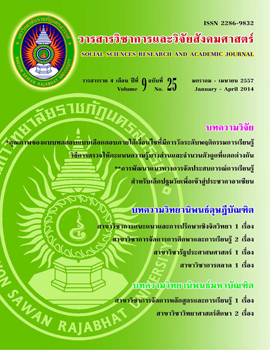ความสัมพันธ์ระหว่างการจัดการวิสาหกิจชุมชนกับหลักปรัชญาของเศรษฐกิจพอเพียง: กรณีศึกษาวิสาหกิจชุมชนกลุ่มผู้ผลิตผ้าไหมภาคตะวันออกเฉียงเหนือ
Main Article Content
Abstract
บทคัดย่อ
การวิจัยนี้มีวัตถุประสงค์เพื่อศึกษาการจัดการวิสาหกิจชุมชนในเรื่องการพึ่งพาตนเอง การจัดการทุนชุมชน และการจัดการการเรียนรู้ของชุมชนผู้ผลิตผ้าไหมศึกษาหลักปรัชญาของเศรษฐกิจพอเพียงในเรื่องชุมชนพอประมาณ ชุมชนมีเหตุผล และชุมชนมีภูมิคุ้มกันที่ดีของชุมชนผู้ผลิตผ้าไหมศึกษาความสัมพันธ์ระหว่างการจัดการวิสาหกิจชุมชนผู้ผลิตผ้าไหมกับหลักปรัชญาเศรษฐกิจพอเพียงของชุมชนผู้ผลิตผ้าไหมและศึกษาตัวแบบชุมชนผู้ผลิตผ้าไหมที่มีการจัดการวิสาหกิจชุมชนที่มีในระดับสูงพร้อมกับการนำหลักปรัชญาเศรษฐกิจพอเพียงไปใช้อย่างยั่งยืน ผลการวิจัยพบว่า
1. กลุ่มผู้ผลิตผ้าไหมภาคตะวันออกเฉียงเหนือ มีการดำเนินการจัดการวิสาหกิจชุมชนอยู่ในระดับมาก
2. กลุ่มผู้ผลิตผ้าไหมภาคตะวันออกเฉียงเหนือมีการดำเนินงานตามหลักปรัชญาของเศรษฐกิจพอเพียงของอยู่ในระดับมาก
3. การจัดการวิสาหกิจชุมชนกับหลักปรัชญาของเศรษฐกิจพอเพียงด้านชุมชนพอประมาณมีความสัมพันธ์กับชุมชนมีเหตุมีผล และชุมชนมีภูมิคุ้มกันที่ดีในระดับสูง
4. ตัวแบบชุมชนผู้ผลิตผ้าไหมที่มีการจัดการวิสาหกิจชุมชนในระดับสูงพร้อมกับการนำหลักปรัชญาของเศรษฐกิจพอเพียงไปใช้อย่างยั่งยืนพบว่าผลการวิเคราะห์เส้นทางความสัมพันธ์ของตัวแบบการจัดการวิสาหกิจชุมชนด้านการจัดการแบบพึ่งพาตนเอง การจัดการเรียนรู้ของชุมชนกับหลักปรัชญาของเศรษฐกิจพอเพียงด้านชุมชนพอประมาณพบว่าหลักปรัชญาของเศรษฐกิจพอเพียงด้านชุมชนพอประมาณ ได้รับอิทธิพลทางตรงจากการจัดการแบบพึ่งพาตนเอง และการจัดการเรียนรู้ของชุมชน
Abstract
The purpose of the research was to study the relationships between the management of small and micro community enterprises (SMCE) and the philosophy of sufficiency economy. This case study research was conducted to the SMCE’s of silk weaving groups in the Northeast of Thailand. The foci of the study were the management (self-reliance, community capital management, and learning management) and the sufficiency economy philosophy (moderation, reasonableness, and self-immunity of the communities). Models of communities with highly effective management of SMCE’s and sustainable practices of the sufficiency economy philosophy were also studied. The population of the research comprised 1,203 groups.
The findings are as follows:
1. The SMCE’s of the silk weaving groups in the Northeast of Thailand were at the high level.
2. The sufficiency economy philosophy based operations of the silk weaving groups in the Northeast of Thailand were at the high level.
3. The results of the hypotheses testing on the relationships between the management of SMCE’s and the philosophy of sufficiency economy were related with the community moderation principle of the philosophy of sufficiency economy at the high level. The relationship with community reasonableness and community self-immunity was at the high level.
4. The results of the study of model communities with highly effective management of SMCE’s and sustainable practices of the sufficiency economy philosophy are as follows: The analysis of the pathways of the relationship between self-reliance, and learning management of the model communities and the community moderation principle under the sufficiency economy philosophy showed that community moderation was directly affected by self-reliance and learning management.


